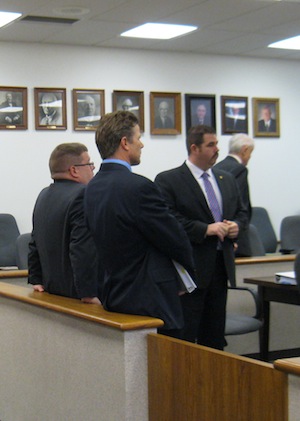
Jonathan Meyer, Will Halstead and Bruce Kimsey of the prosecution team face the judge’s bench in Lewis County Superior Court.
By Sharyn L. Decker
Lewis County Sirens news reporter
CHEHALIS – Lawyers on both sides in the Ricky Riffe murder trial accused each other of misconduct as the fifth week of proceedings began to wind down.
The conversation in Lewis County Superior Court before the jury was called into the courtroom on the surface was about whether a local attorney should be called to the witness stand but at its root revolved around whether a jailhouse snitch got a deal in exchange for saying Riffe confessed to him.
Defense attorney John Crowley told the judge he would file a motion for prosecutorial misconduct and would be asking that Lewis County Senior Deputy Prosecutor Will Halstead be disqualified from the case.
Halstead, who is handling the prosecution along with elected Lewis County Prosecutor Jonathan Meyer, shot back.
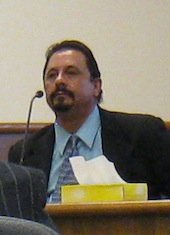
Erwin Bartlett
“I hope Mr. Crowley attaches the threatening email he sent that he would not file it if the state would stipulate to certain facts,” Halstead said. “That in itself is misconduct.”
Judge Richard Brosey ruled the informant’s lawyer should be called, saying the jury is entitled to know if the inmate did or did not get “consideration” in exchange for his testimony.
Under questioning by Halstead late last week, Erwin Bartlett denied he was getting anything in return for taking the stand, but when presented with the plea agreement document, said he didn’t remember much about the hearing as his liver ailment was causing him pain.
Brosey indicated he’s listened to many informants over the years and said his impression was Bartlett may have expressed confusion by design and it might be that he’s “smart like a fox”.
Crowley told the judge his client’s case was irreparably damaged by the matter.
Jurors sent home for the weekend were told to return Tuesday morning because Monday is a holiday. However, court is scheduled to begin for the attorneys early that day as they argue the defense motion.
Crowley represents Riffe, the 55-year-old former Mossyrock resident who was arrested last year at his home in Alaska and charged in the December 1985 shotgun deaths of an elderly couple who lived in Ethel.
Prosecutors contend Riffe and his now-deceased younger brother were responsible, that someone forced Ed and Minnie Maurin to drive to their bank to withdraw thousands of dollars and then to the woods near Adna where they were shot in their backs inside their car and dumped along a logging road.
Jurors since early October have heard dozens of state’s witnesses describe the day the couple vanished from their home, seeing them with someone else in their green sedan and observing an unshaven man in an Army jacket with a gun at or near Yardbirds Shopping Center in Chehalis where the car was abandoned. Both Riffe and his brother John Gregory Riffe have been pegged as the person in a composite drawing and in photo montages.
A former drug dealer has testified Riffe told him he thought they got away with it, a woman who conducted an online relationship with him has said he made references to it and a Mossyrock man said he remembers overhearing the brothers planning it. But prosecutors have no fingerprints or DNA evidence that ties either brother to what has been described as one of the most horrendous murder cases in Lewis County.
When Bartlett took the witness stand on Oct. 31, he was forthright about his own crimes and how he came to be locked up in the Lewis County Jail, in an adjacent cell to Riffe early this year.
The now-50-year-old told of escaping New Mexico State Penitentiary where he was serving time for two counts of attempted first-degree murder – he said he took an axe handle to two men he caught on his living room floor with his wife.
When asked, he said in prison he built couches for a dental office and one day took the guts out of one of them, climbed inside and got loaded onto a flatbed truck. Bartlett said he was free for six months and 11 days before he was apprehended and ended up serving about 13 and half years.
He returned to Washington in 2007 and this past winter was serving six months in the Lewis County Jail for assault, he testified.
Bartlett lives in Hoquiam, but considers Chehalis his hometown. He told of getting to know Riffe earlier this year.
“I met Rick probably several days after I was in the medical unit,” he said. “I told him what I was in for, he told me what he was there for.”
Later, after Bartlett returned from a medical furlough and was caught trying to smuggle a prescription medication back into the jail, he tried to negotiate for leniency in exchange for information on fellow inmates, he testified.
His charge was a felony, possession of a controlled substance by a prisoner.
“What consideration did you receive?” Halstead asked him.
“None, I was told by you I wouldn’t get any,” Bartlett said.
Under questioning by Halstead, he began to describe the conversations he and Riffe had.
“First, I want to say, when you get locked up like we are, you really tend to say things,” Bartlett said. “I laid my heart out.”
He shared what he knew about his fellow inmate, that he said he lived in Alaska, loved the outdoors and fishing and hunting, and did odd jobs.
“I know he had sleep apnea and COPD, a respiratory problem,” he said.
Bartlett said Riffe showed him pictures of his wife and children and that they both liked to read Westerns.
“I believe this conversation happened through the vent,” he said. “We call it the “cell” phone.”
“He told me that he committed a crime, that he had killed two old people and that’s what happened,” Bartlett testified.
The witness went on to say Riffe told him that he had help, he thought an accomplice who was “no longer here.”
He said they took one of the individuals to the bank, and maybe said the cops might have a picture of the ATM driving through, according to Bartlett.
Riffe also complained about his well-paid attorney from Seattle not coming to see him, not talking to witnesses, he said.
“He told me it was a bad, bad mistake,” he said. “I think the first time he told me he did it, the second time he said allegedly.”
Under questioning by Crowley, Bartlett said he has already pleaded guilty to the smuggling charge and wasn’t sure why he hasn’t yet been sentenced.
Asked if he was receiving anything in exchange for his testimony against Riffe, he said it’s never a sure thing, but he sure hopes so.
The defense attorney put a document in front of the witness and asked if prosecutors were going to recommend he get a 30-day sentence.
“As I said, I don’t remember anyone discussing this with me,” Bartlett said.
The witness recalled he was looking at 12 months maximum, given his background.
The document was signed by Halstead, the one who prosecuted his case.
The jury was sent out of the room, when Halstead objected.
Crowley told the judge he’d gone to the clerk’s office the day before and gotten a copy of Bartlett’s case documents.
Halstead told the judge it was Bartlett’s attorney’s bad habit to attach a copy of the plea offer sheet to the filing.
“This document was not in discovery,” Crowley told the judge. “Obviously there is consideration, it sticks out like a sore thumb.
“I’m not going to let this go.”
Centralia lawyer David Arcuri was called as a witness subsequently and testified he had no idea what his client Bartlett told law enforcement about Riffe.
The plea agreement however, was if Bartlett testified truthfully in the Riffe case, Halstead would tell the judge he should get 30 days for bringing drugs into the jail but if he didn’t, Halstead would seek the maximum sentence, according to Arcuri.
The state said they expect to rest on Tuesday. The defense will then begin to call its witnesses and closing arguments could take place, or at least begin, by the end of the week.
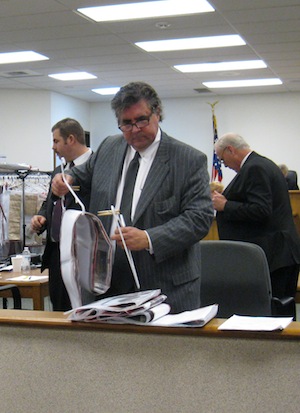
John Crowley looks through case exhibits at the end of the day.
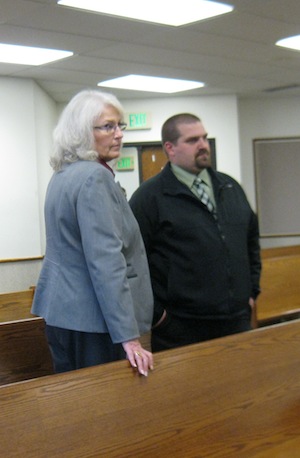
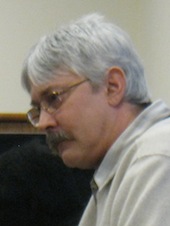
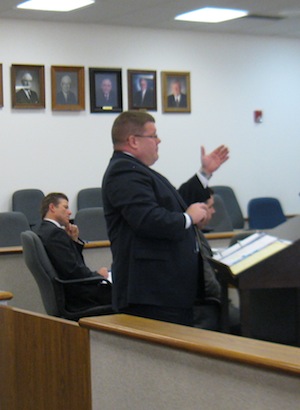
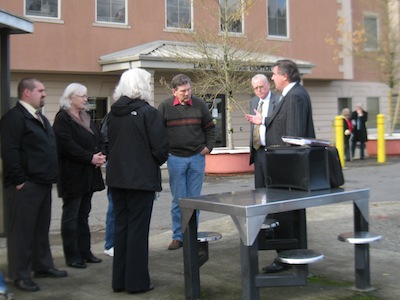



 Join us
Join us